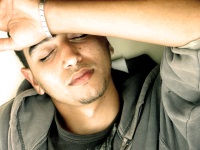Recognizing Narcolepsy Symptoms

Narcolepsy symptoms typically begin to appear sometime between the ages of 15 and 25. Yet, they can show up when you are younger or older, especially if there is a genetic component or a hormonal imbalance that serves as the trigger.
In the early stages of this sleep disorder, the symptoms of narcolepsy are usually mild and take the form of excessive daytime sleepiness. This is also the most common marker of narcolepsy.
It is important to note that this feeling of exhaustion – often accompanied by memory and concentration problems, anxiety, depression, and/or an over-emotional state – may be indicators of other types of sleep disorders such as insomnia or sleep apnea.
So if feeling exhausted all the time is your only symptom, you could be suffering from any of these sleep-related problems.
Yet with narcolepsy, this early symptom is usually followed by sudden and uncontrollable urges to sleep, which can come over you anytime, anywhere. If you fall asleep suddenly while driving, cooking, exercising, or during any activity, it is obviously dangerous to you and those around you.
In addition, individuals with narcolepsy may experience the following symptoms.
- Cataplexy - This condition is a characterized by a sudden loss of muscle tone and strength, usually caused by an extreme emotional stimulus. Cataplexy is experienced by around 75% of narcoleptics. It can range from being a mild loss of control for which you can compensate to being severe enough to cause you to physically collapse.
Although a severe attack of cataplexy can leave sufferers unable to move or talk, they remain fully conscious. These sleep attacks can last anywhere from a couple of seconds, to several minutes or more. - Sleep Paralysis - Sleep paralysis occurs in about six out of 10 sufferers. It causes similar results to cataplexy, but only happens when you're falling asleep or waking up. Again, there's no loss of consciousness - just a temporary inability to move or speak. Some narcoleptics report a brief sensation of being unable to breath.
- Hallucinations - About half the people who suffer from narcolepsy will experience hallucinations, which are vivid dream-like visions or delusions. Hallucinations may involve several senses (such as hearing, taste, and touch) rather than being solely a visual experience. Like cataplexy, hallucinations occur as you're falling asleep or when you're waking up.
In addition to the dangers associated with the above symptoms, narcoleptics are often sleep-deprived, which produces other serious health risks. Therefore, you need to see your doctor right away so that you can get a correct diagnosis and start treatment.
Once your symptoms are under control, you can expect the quality and quantity of your sleep to improve dramatically. In turn, you will feel better and enjoy life more.
Related Information - Narcolepsy Symptoms
What is Narcolepsy?
Causes of Narcolepsy
Sleep Disorders
Share Sleep Tips Do you have a great tip to share with others who are struggling with sleep? What works for you might help someone else. |



